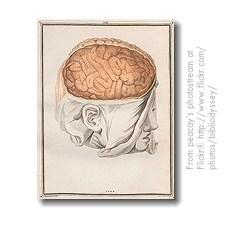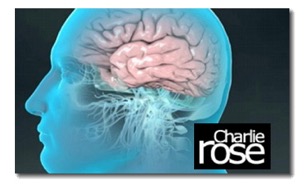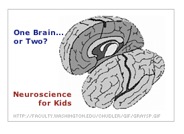Neuroscience
Félix Vicq D'Azyr (1786) Brain Images
2012/09/03 15:11

BTW, while he died during The Terror period of the French Revolution (1794), his passing was due to pneumonia rather than the guillotine.
I was struck both by how beautiful the engravings are as well as their accuracy/informative quality. A link is provided to the set on Flickr® with varying sizes available of each plate for download and use.
At the bottom of the entry, there is a very helpful list of online sources regarding Vicq D'Azyr and this volume.
BrainFacts.Org
2012/05/08 13:08

The brain is the most complex biological structure in the known universe. It is a topic rich with exciting new discoveries, continuing profound unknowns, and critical implications for individuals, families, and societies.
The site is a public information initiative of The Kavli Foundation, the Gatsby Charitable Foundation, and the Society for Neuroscience, all leading global nonprofit organizations working to advance brain research. Leading neuroscientists from around the world form the BrainFacts.org editorial board." (site blurb)
The site has sections dedicated to
- Neuroscience in General
- Brain Basics
- Sensing, Thinking, and Behaving
- Diseases & Disorders
- Across the Lifespan
- In Society
Charlie Rose: Brain Series
2012/03/24 14:52

- Episode 1 - The Great Mysteries of the Human Brain
- Episode 2 - The Perceiving Brain
- Episode 3 - The Acting Brain
- Episode 4 - The Social Brain
- Episode 5 - The Developing Brain
- Episode 6 - The Aging Brain
- Episode 7 - The Emotional and Vulnerable Brain
- Episode 8 - The Anxious Brain
- Episode 9 - The Mentally Ill Brain
- Episode 10 - The Disordered Brain
- Episode 11 - The Deciding Brain
- Episode 12 - The Creative Brain
- Episode 13 - Highlights from the Series
Seems like a series I want to explore some more. Each episode can be viewed online or purchased as a DVD.
The Split Brain
2012/03/15 14:13
A news feature at Nature, "The Split Brain: A Tale of Two Halves" should intrigue psychologists and others interested in the development of our understanding of hemispheric dominance in the brain. Written by David Wolman, it describes the role of patients in the 1960s enlisted after their "split brain" operations (cerebral commissurotomies) as Roger Sperry, Michael Gazzaniga, and others learned about the brain's functioning from their responses to testing.
Wellcome Collection: Brains
2012/03/10 16:00

"Our major new free exhibition seeks to explore what humans have done to brains in the name of medical intervention, scientific enquiry, cultural meaning and technological change. Featuring over 150 artefacts including real brains, artworks, manuscripts, artefacts, videos and photography, 'Brains' follows the long quest to manipulate and decipher the most unique and mysterious of human organs, whose secrets continue to confound and inspire. 'Brains' asks not what brains do to us, but what we have done to brains, focusing on the bodily presence of the organ rather than investigating the neuroscience of the mind."
A series of images galleries displays figures which illustrate
- Measuring-Classifying
- Modelling-Mapping
- Cutting-Treating
- Giving-Taking
Blog & News Media Roundup (April 2-9, 2009)
2009/04/10 14:38
Here are some entries online from the blogs and other news media which caught my attention this past week.
New York Times
New York Times
- Brain Researchers Open Door to Editing Memory • Benedict Carey • 2009045 • “Suppose scientists could erase certain memories by tinkering with a single substance in the brain. Could make you forget a chronic fear, a traumatic loss, even a bad habit. Researchers in Brooklyn have recently accomplished comparable feats, with a single dose of an experimental drug delivered to areas of the brain critical for holding specific types of memory, like emotional associations, spatial knowledge or motor skills.“
- When All You Have Left Is Your Pride • Benedict Carey • 20090406 • “Keeping up appearances, psychologists say, is about much more than appearance...”
- A Life’s Journey in Neuroscience • 20090401 • “New Scientist has an excellent cover article on 'The five ages of the brain', looking at how the brain changes as we grow and how these transformations are reflected in our lives. It breaks the life span down into 'five ages', with a short article for each - tackling gestation, childhood, adolescence, adulthood and old age.”
- Solitary Confinement • 20090403 • “The New Yorker magazine has just published an important article questioning whether the widespread use of solitary confinement in the US prison system should be outlawed as a form of torture. It's an in-depth piece that piece that looks at numerous cases of people who have experienced solitary confinement first hand, either as hostages or legitimate prisoners, and discusses the psychological impact of this extreme form of social isolation”
- The Myth of Thomas Szasz? • 20090404 • “Psychiatrist and iconoclast Thomas Szasz takes part in a hard-hitting interview on ABC Radio National's All in the Mind where he shows that at the age of 89 he's lost none of his fire which has raged through psychiatry for almost 50 years. It's a two part interview with the second appearing next week and it's classic Szasz. He's an important thinker because he relentlessly attacks the conceptual foundations of psychiatry, the definitions which usually can't be empirically tested because they're philosophical issues - in other words, the assumptions we need to make about the world before we can start measuring anything.”
- Imaging the transgendered brain • 20090405 • “For the first time, the brain structure of male-to-female transsexuals has been investigated in living individuals using MRI brain scans, helping to fuel the debate over the possible neural basis of gender identity.”
- When dreams come to life • 20090408 • “But dreams can come to life and the effect is no less fantastical. In REM sleep behaviour disorder (RBD), normal sleep paralysis breaks down and sleepers act out their dreams - giving observers a remarkable insight into the dreaming mind. An article recently published in Neurology charted the range of sleep behaviours seen in people with neurological disturbances such as narcolepsy, Parkinson's disease or other types of dementia, all of which can trigger the problem.”
- Stress, Poverty, Working Memory • 20090402 • “A new study has demonstrated, once again, that being poor is stressful, and that chronic stress is poison for the brain.”
- Money Illusion • 20090403 • “This is known as the money illusion, since people appear more likely to think about money in nominal rather than real values. In other words, we forget that money is subject to inflation, and that a dollar can mean different things at different times...A new paper by a team of German neuroscientists and economists outlines the cortical anatomy underlying this profound violation of the rational agent model.”
- Investing in the Developing Brain • 20090408 • But there has been one major payoff from our investigations of the brain: an increasing emphasis on educating young children, before they reach kindergarten. Decades of research have demonstrated that the cortex is astonishingly plastic at a young age and that many important traits and habits seem to solidify before the age of 4. (This isn't to discount the power of plasticity in the adult brain - it just takes a lot more work to make it happen.) When combined with the brilliant work of James Heckman, this research led policymakers to realize that investing in pre-K education had an incredibly high-rate of return.”
- Do Parents Matter? • 20090409 • “Over at Mind Matters, I've got an interview with Judith Rich Harris, author of the influential and infamous The Nurture Assumption, which provocatively argued that parents aren't particularly important when it comes to determining the behavior of their children, at least outside of the home. Instead, Harris argued that the most important variable was the child's peer group.”
- Stress and Sadness • 20090409 • “Sometimes, the human brain can seem astonishingly ill-equipped for modern life. Our Pleistocene olfactory cortex craves glucose and lipids, which makes us vulnerable to high-fructose corn syrup and Egg McMuffins. We've got an impulsive set of emotions, which makes us think subprime mortgages are a good idea. And so on. If I could only fix one design flaw, however, I'd focus on our stress response. We're stuck with a mind that reacts to the mundane mundane worries of modern life - a falling stock market, a troubled marriage, taking the SAT - with a powerful set of primal chemicals that, once upon a time, were reserved for moments of "fight or flight". In other words, we treat everything like an existential threat, which is why a multiple choice exam can leave us panicky and breathless...The problem with this blunt reaction to stress - it's too often all or nothing - is that, as I've written numerous times, chronic stress is really bad for you. It causes chronic back pain, weakens the heart and kills brain cells.”
- Even isolated cultures understand emotions conveyed by Western music • Dave Munger • 20090408 • “The researchers say this shows that at least some portion of music appreciation may be universal. The more dramatic effects among Western listeners suggest that cultural influences may also contribute, but some basic part of the the way we understand music may be shared by everyone, no matter what we have learned from our culture.”
- Possibility Of Brain Scan-assisted Diagnosis For PTSD A Step Closer • 20090406 • “Preliminary research examining the difference in brain activity between soldiers with post-traumatic stress disorder and those without it moves scientists a step closer to the possibility of being able one day to use brain scans to help diagnose the condition...”
- Depression in Teenagers: Experts Say to Screen All • Lindsay Lyon • 20090407 • “The subject of depression in teenagers was thrust into the national dialogue recently when a government-appointed panel of medical experts advised that primary-care doctors routinely screen all patients ages 12 to 18 for major depression, an about-face from a 2002 conclusion that there was insufficient evidence to recommend for or against doing so. Now, the U.S. Preventive Services Task Force says in April's Pediatrics, there's "adequate evidence" that screening tests do a good job of accurately detecting depression in teenagers and adolescents—important, it says, since "the majority of depressed youth are undiagnosed and untreated.’ “
